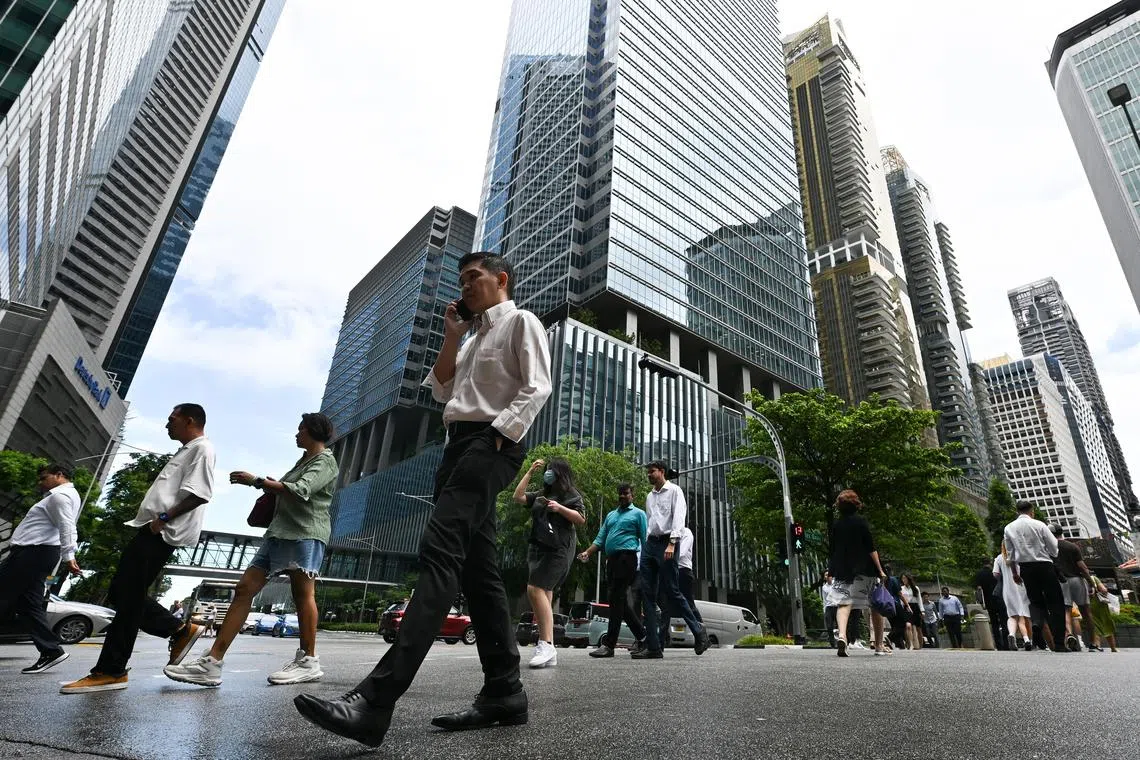More S’pore businesses expect economy to worsen, cost pressures to rise: SBF survey
Sign up now: Get ST's newsletters delivered to your inbox

Businesses here are also anticipating rising cost pressures over the next six months, the survey found.
PHOTO: ST FILE
Therese Soh
Follow topic:
SINGAPORE - The business outlook here has weakened considerably amid growing economic uncertainty, according to a Singapore Business Federation (SBF) survey released on May 28.
The percentage of businesses that see the economy worsening over the next 12 months nearly doubled on the quarter, from 22 per cent in the fourth quarter of 2024 to 40 per cent in the first quarter of 2025, the National Business Survey (NBS) 2025 found.
“This bearish sentiment is shared by both small and medium-sized enterprises, with the proportion expecting worsening conditions increasing from 23 per cent to 41 per cent, and large companies, where the figure rose from 18 per cent to 38 per cent over the same period,” the survey indicated. It collated responses from 526 businesses across major sectors.
Businesses in the hotels, restaurants and accommodation, health and social services as well as retail trade sectors showed high pessimism about economic prospects for the next 12 months, SBF said.
Notably, the hotels, restaurants and accommodation sector had the most cautious outlook.
It recorded the lowest score among all sectors for Business Sentiment Index (BSI) – a new indicator that consolidates key measures that capture business confidence.
The sector’s BSI of 52.2 was below the overall BSI of 56.5.
It also reported the lowest levels for revenue expectations, profitability expectations, positive business expansion outlook and level of planned capital investment, and had the least optimistic business growth confidence level.
Moreover, businesses are anticipating rising cost pressures over the next six months, NBS found.
The real estate and hotels, restaurants and accommodation sectors faced the highest cost expectations, with BSI scores at 78.4 and 71.9, respectively.
Some bright spots
While overall sentiment is cautious, some sectors showed optimism.
The banking and insurance as well as education sectors were the most optimistic, with BSI scores of 61.2 and 60.5, respectively. These two sectors logged the highest revenue expectations.
Sectors with the highest profitability expectations included the education sector with a 60.8 score, the real estate sector with 60.4, and the banking and insurance sector with 59.1.
Business expansion outlook remained moderate at 61.6, indicating some optimism for growth – particularly for the sectors of education with a BSI of 66.6, and banking and insurance with a BSI of 65.6.
Hiring outlook had a 57.7 score, suggesting that businesses intend to maintain their current workforce size.
The hotels, restaurants and accommodation, IT and related services and education sectors had the most optimistic hiring outlooks with BSI scores of 67.4, 61.8 and 60.1, respectively.
Businesses also identified the five most useful measures that emerged from Budget 2025.
These were the 50 per cent corporate income tax rebate; the enhancement of the Progressive Wage Credit Scheme; the Central Provident Fund transition offset; the extension of Senior Employment Credit; and the new SkillsFuture Workforce Development Grant.
Strong transformation momentum, liquidity concerns
Transformation momentum remains strong as businesses are continuing to pursue long-term competitiveness through enterprise and workforce transformation, the survey found.
SBF chief executive Kok Ping Soon said: “It is important that businesses stay the course in enterprise and workforce transformation by leveraging on the slew of government support.”
Despite this, challenges of high costs of adopting new technologies and manpower crunches when staff attend training persist.
Internationalisation and artificial intelligence development schemes emerged as top priorities for enterprise transformation, NBS said.
The redesigned SkillsFuture Enterprise Credit and SkillsFuture Workforce Development Grant were the most preferred initiatives for workforce transformation.
Liquidity was a key concern for businesses as around a quarter face a moderate to severe credit crunch – with 35 per cent of these reporting insufficient cash to operate for three to six months, NBS found.
Businesses also wanted greater government support on financing related programmes, more flexible repayment terms and access to alternative financing solutions.
Noting that accessibility and cost of financing were areas of concern, Mr Kok said SBF hopes to work with the government and financial institutions to better support businesses.
This comes as some businesses may now require larger financing lines and longer financing terms amid the impact of US tariff measures, THE BUSINESS TIMES

